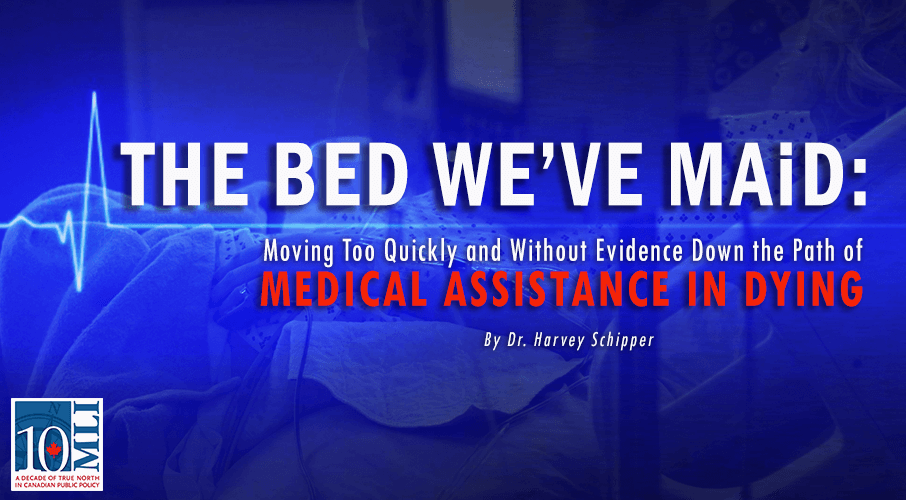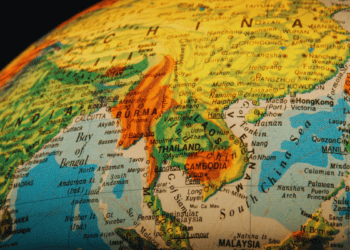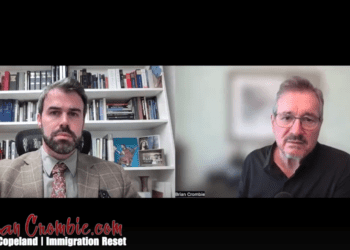 OTTAWA, ON (February 14, 2020): With the federal government set to introduce legislation to expand Medical Assistance in Dying (often referred to as MAiD), health policy expert Dr. Harvey Schipper warns that Canada is “moving too quickly, and without evidence or understood experience, down a pathway of immense societal consequence.”
OTTAWA, ON (February 14, 2020): With the federal government set to introduce legislation to expand Medical Assistance in Dying (often referred to as MAiD), health policy expert Dr. Harvey Schipper warns that Canada is “moving too quickly, and without evidence or understood experience, down a pathway of immense societal consequence.”
In MLI’s latest commentary titled “The Bed We’ve MAiD: Moving Too Quickly and Without Evidence Down the Path of Medical Assistance in Dying,” Dr. Schipper takes a hard look at the thousands of Canadians’ lives that have been ended through MAiD since 2016 and the difficult questions that remain about the impact on patients, families, doctors, and society more broadly.
The MAiD debate is one that Canadians must grapple with, according to Schipper. The 2019 Quebec Superior Court decision in the Truchon case removed the provision in Canada’s MAiD legislation that death must be “reasonably foreseeable”, and the federal government has promised a new bill in the coming weeks.
As well, we will soon be approaching the mandated five-year review of Bill C-14, and there is growing pressure to expand MAiD to include advance directives, to mature minors, and to those with mental disorders as the sole underlying condition.
Dr. Schipper calls for caution. “Seven thousand Canadians have chosen MAiD since Bill C-14 came into effect. Had those deaths been from medical errors, or a new infectious disease, or a rash of household fires, we would want to understand those circumstances and mitigate them. Why not with MAiD?”
His paper raises a number of questions that need answering before we expand MAiD:
- How do we know that when MAiD is offered and provided that it meets stringent requirements?
- What does it mean to be a healer, physician, nurse or alternative health provider who is involved in medically assisted death?
- With the ambiguity of the language in the Supreme Court’s Carter decision and in Bill C-14, how can we define consent to a medically assisted death?
- Can we continue to exclude people of faith from what is essentially a moral question?
- Where do we prioritize our resources and energies in the provision of health and the fostering of a quality of life?
- Have we done enough to understand the circumstances of the thousands of medically assisted deaths in Canada in the last few years?
- More fundamentally, how do we value a life?
Dr. Schipper, who was a member of the Council of Canadian Academies Expert Panel on Medical Assistance in Dying, concludes that “I have an abiding concern that a narrowly legal approach to this values-based health care problem is dangerous.” He adds that five years after the Carter decision, we have a great deal of work to do to find the proper role for MAiD in Canadian society.
To learn more about MAiD, its impacts, and why Dr. Schipper cautions policy-makers to take next steps carefully, read the full commentary paper here.
***
Dr. Harvey Schipper is both an engineer and a physician who has combined disciplines to bring innovation to the health and life sciences sector. His career has bridged five continents as cancer specialist, innovator, health systems designer, businessman and advisor to government, academe and the corporate sector.
For more information please contact:
Brett Byers
Communications and Digital Media Manager
613-482-8327 x105
brett.byers-lane@macdonaldlaurier.ca




